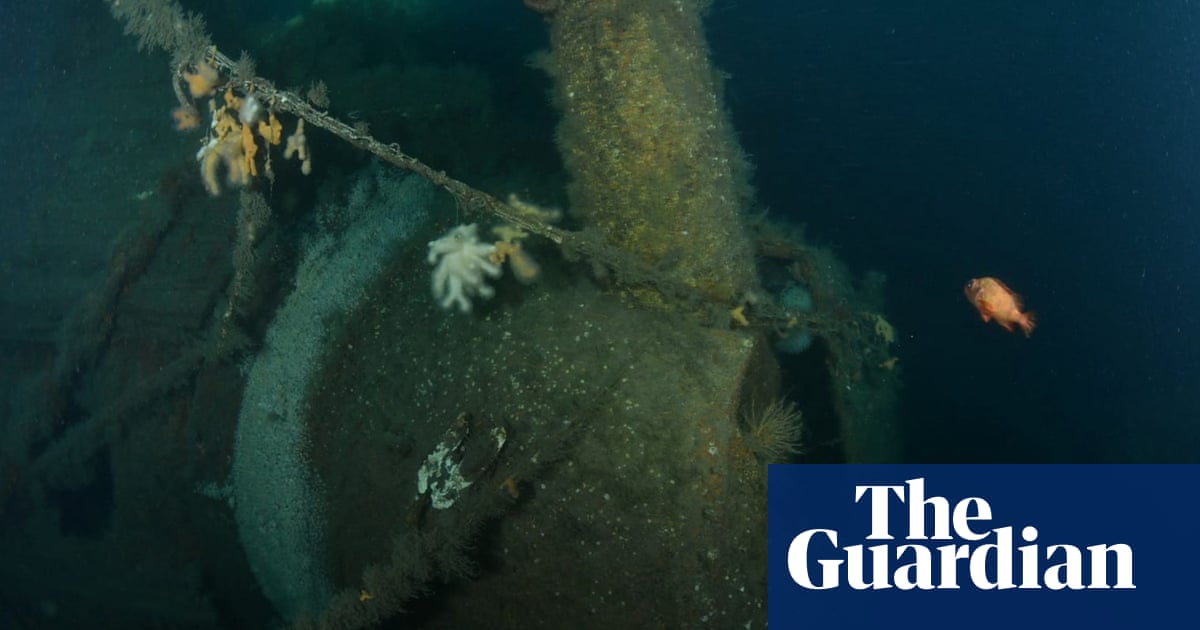‘Virtually intact’ wreck off Scotland believed to be Royal Navy warship torpedoed in first world war

A team of UK divers has hailed the discovery of a wreck off Scotland believed to be a Royal Navy warship sunk during the first world war but still “virtually intact”.
The team found what it thinks is HMS Hawke – which sank after being hit by a German torpedo in October 1914 – in the North Sea earlier this week.
Paul Downs, who was among the divers and filmed footage of the long-lost wreck, described it as “a once in a lifetime” discovery given its “unbelievable” condition.
“She is virtually intact,” he told Agence France Presse. “The state of preservation is unbelievable for a wreck that’s 110 years old and came to a violent end.”
Lost in Waters Deep, a group which searches for first world war shipwrecks in Scottish waters, spearheaded the years-long effort to find the warship.
The team is now awaiting official confirmation from the Royal Navy after providing it with their findings.
Only 70 of HMS Hawke’s crew survived, while more than 500 died, after it was attacked by a German U-boat in the early months of the first world war.
The warship, an Edgar-class cruiser first launched in 1891, was 387ft (118 metres) long and 60ft (18 metres) wide.
It caught fire, exploded and then disappeared beneath the murky waters of the North Sea off north-east Scotland in less than eight minutes.
The vessel has rested on the seabed – 110 metres down – ever since.
Downs said that depth likely played a role in preserving it.
Its guns, other armaments, decking and some interior features like a clock and wall-mounted barometer were all still visible, despite more than a century on the seabed.
“It avoids the storms that the North Sea will get during the winter,” Downs said.
He noted the warship had also been built with “absolutely top-quality” materials at the height of the British empire.
“All the brass work on the wreck, like the portholes and the breaches for the deck guns, are all still shiny … it’s probably due to the fact that she was just built so well.”
Lost in Waters Deep spent years pinpointing where it suspected the warship had sunk, including researching the U-boat commander’s journal and the logs of other Navy cruisers that had been in contact with it.
after newsletter promotion
The team was also helped by a report of a seabed “obstruction” reported in the 1980s – though the wreck was actually found 1km (more than half a mile) away from that.
HMS Hawke was one of the first Royal Navy vessels lost in the conflict, as Britain’s fleet initially struggled to adapt to the threat of German U-boats.
“Historically, she’s very significant,” noted Downs.
He predicted the wreck could not be successfully salvaged after so long sitting on the seabed, but the final decision would be down to the Royal Navy.
“I would imagine that she will become a controlled wreck, so she’ll be classed as a war grave.
“So at some point in the future, you may be able to dive, but just not touch anything.
“It’s basically an archaeological site. So everything’s filmed and photographed and left in situ.”
The Royal Navy told UK media it appreciated the efforts made to locate the wreck.
“Once the evidence to support this find is received, it will enable our historians to formally identify the wreck,” a spokesperson said.
Related
Newspaper headlines: ‘Putin’s dirty work in UK’ and ‘Honeytrap spies’
The Times focuses, external on Donald Trump's latest comments about the war in Ukraine. Its headline quotes the US president, who said Vladimir Putin was "doing
‘This could end in World War Three,’ warns Trump as…
7 March 2025, 17:31 | Updated: 7 March 2025, 18:06 'This could end in Worl
Met Office ‘polar vortex’ update as temperatures to plummet
The weather is expected to quickly change after a spell of sunshineThe Met Office has warned that "colder weather is on the way."(Image: Liverpool ECHO)It is fo
British Pie Awards 2025: Naan better as kebab pie wins…
The Turkish-tinged creation by Boghall Butchers - which is celebrating its 50th year in business - won through in the newly-formed fusion category, which also f













